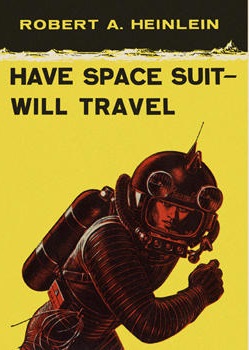
I had many favourite books as a child. I was very fond of the Dragonfall 5 books by Brian Earnshaw, the Biggles books by Cpt WE Johns, Have Spacesuit Will Travel by Robert Heinlein, and Larry Niven's Ringworld Engineers. I also read 2000AD whenever I could, and I still have the 1979 2000AD annual on my bookshelves. However, the book I remember with most fondness is a book aimed at younger readers. The Bears Who Stayed Indoors by Susanna Gretz and Alison Sage, first published in 1971, is the story of four bears and their dog who, when forced by rain to stay indoors, play at being astronauts. As a young child (I'm thinking around 4 years old), I absolutely adored it. A quick search of Amazon shows that the book is still in print, and I have no hesitation in recommending it to anyone with a little would-be astronaut in their life.
2. Your current favourite
I have a different favourite book every week; but my all-time favourite will always be On The Road by Jack Kerouac. It's a vast, sprawling epic and a masterpiece of compelling narration, and I still rate it as my number one favourite book of all time. Every time I read it I see something new, and I'm struck again by the rhythm and poetry of the language, and the immediacy of Kerouac's descriptions. When he writes about sleeping on a hot car roof in the sticky jungle, and the soft rain of bugs falling on his skin, you're right there with him. I think Kerouac's a very misunderstood writer. People get caught up with the beatnik craziness, and they miss the sadness at the heart of the book: the unspeakable, inescapable loneliness of the American night.
3. Your top five authors
> Ernest Hemingway
> William Gibson
> M. John Harrison
> JG Ballard
> Philip K. Dick
4. Book(s) you’re reading now
I tend to read several books at once, and am currently in the midst of Cyber Circus by Kim Lakin-Smith, Gonzo by Jan Wenner and Corey Seymour, and Player One by Douglas Coupland.
5. Book(s) you’ve bought for the cover
I was fascinated by the covers to Kim Stanley Robinson's Mars trilogy. The first, Red Mars, showed spacesuited figures in a lifeless landscape of canyons and rock; the second, Green Mars, depicted an airship flying over the same terrain, except now there was snow in the valley and green shoots between the boulders; and the final cover had a coastal town, pine trees and a schooner sailing a blue inlet at the foot of a red mountain. The transformation was startling, and promised an epic tale unfolding over time - which I'm glad to say the books within delivered.
6. Book that changed your life
I think the book that most shaped my development as a writer has to be William Gibson's Burning Chrome. Until I read it, I was still immersed in the old school fiction of Niven, Clarke and Heinlein, with its unshakeable faith in a rational, technological and largely American future. Gibson showed me something else. His stories felt more immediate and real. They were gritty and dangerous, but the lowlife grifters that peopled them were more believeable than the traditional "scientist as hero" types I had been used to, and the stories were written in a hardboiled, pared-down argot that wasted not one word. It was a revelation and a masterclass all rolled into one.
7. Book you most want to read again for the first time
I loved Douglas Coupland's Generation X. I read it at university, in my early twenties, and it was like a postcard from the other side of the world saying: "Don't despair. We are here, and we understand how you feel." The three main characters shared the same aimless, post-cynical weltanschauung that I saw in the faces of my friends. It seemed to be the first book I'd ever read about *us*. I'd love to read it again for the first time, to feel that thrill of recognition; but also, now I am in my forties, I'm sure it would also have a new nostalgic element that just wasn't yet there two decades ago.
8. Book you turn to for comfort
When I want the comfort of a familiar book, I often turn to Kerouac or Coupland. Other favourites include: "e" by Matt Beaumont, which is a hilarious book for anyone who's ever worked in a large coporation, especially in marketing and PR, as I have; Nova by Samuel Delany; The Stone Canal by Ken MacLeod; Gateway by Frederik Pohl; and Altered Carbon by Richard Morgan. As my reading time is usually limited, I tend to go for short books. I love long epic trilogies, such as the aforementioned Mars books by Kim Stanley Robinson, but its hard to justify the time to go back and spend a couple of months re-reading them when I have so many new books clamouring for my attention.
9. Favourite line from a book
Not so much a line as a passage, I would like the final speech from Olaf Stapledon's Last And First Men read at my funeral. It's a masterful summation of human ambition and frailty, a view of mankind's place in the universe, and a calm acceptance of its eventual extinction. It begins: "Great are the stars, and man is of no account to them." and finishes, "It is very good to have been man. And so we may go forward together with laughter in our hearts, and peace, thankful for the past, and for our own courage. For we shall make after all a fair conclusion to this brief music that is man."

No comments:
Post a Comment